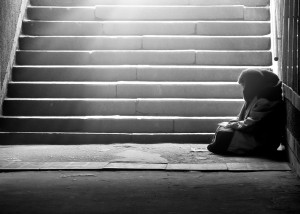Contributed by Jack Saarela, Lutheran Campus Pastor, Yale University
Warm-up Question
It is much harder to see spelling and punctuation mistakes in something you have written than in it is to see the same mistakes in someone else’s work. Why do you think that is?
Blind Spots
 Mark Horvath is a denizen of social media. He tells of a homeless man on Hollywood Boulevard who thought he was invisible. One day a kid handed the man a Christian pamphlet. The homeless man was shocked and amazed, “What?! You can see me? How can you see me? I’m invisible!”
Mark Horvath is a denizen of social media. He tells of a homeless man on Hollywood Boulevard who thought he was invisible. One day a kid handed the man a Christian pamphlet. The homeless man was shocked and amazed, “What?! You can see me? How can you see me? I’m invisible!”
It isn’t hard to comprehend this man’s spiral into invisibility. Once on the street, people started to walk past him, ignoring him as if he didn’t exist. “It’s not that people are bad,” Horvath says, “but if we make eye contact, then we have to admit that they exist, and that we might have a basic human need to care. It’s so much easier to close our eyes and shield our hearts from their existence.”
By way of invisible-people-tv, Horvath uses the lens of a television camera to tell the stories of homelessness and the organizations trying to help. His stated purpose is to make the invisible visible
Discussion Questions
- When you have encountered a homeless person on the streets of the town or city where you live, have you found yourself looking the other way? Can you say why? Does Horvath’s explanation above ring a bell?
- Talk about a time when you looked at someone you thought you knew well, but at that moment, you felt as though you were seeing him or her for the very first time.
- Have you yourself ever been in a situation where you felt invisible, as if everyone was looking past you and not seeing you? Say some more about it.
Scripture Texts (NRSV) for Sunday, June 6, 2010 (Second Sunday After Pentecost)
(Text links are to Oremus Bible Browser. Oremus Bible Browser is not affiliated with or supported by the Evangelical Lutheran Church in America. You can find the calendar of readings for Year C at Lectionary Readings.)
For lectionary humor and insight, check the weekly comic Agnus Day.
Gospel Reflection
The woman in this gospel episode has at least two strikes against her, with the third one not far away. She is a widow, meaning, of course, that she has lost a husband. Now she is in a funeral procession behind the body of her only son. She has she lost two people whom she loves, and because in her society (as in many yet today), a woman is totally dependent for economic support on a male to whom she is bound (father, husband, brother-in-law, or son), she now has no means to live.
One miracle that Jesus performs in this episode is the one identified by the heading for this text in the Oremus Bible Browser: “Jesus Raises the Widow’s Son at Nain.” It’s true; he does, and to give new life to the dead is miracle enough.
But what strikes me as at least as great a miracle is that out of the midst of the large crowd that came to meet Jesus and his disciples when they entered the town, Jesus should actually see this woman. To be sure, she is in a funeral procession. But in a land where death was regular visitor, a funeral procession would not be as noticeable as it is in our day.
This woman is very ordinary, and now rendered absolutely powerless and helpless by tragedy in her life. I wonder how many in the crowd looked past her as they rushed to the town gates to see this phenom Jesus who was arriving. But Jesus brought both the crowd’s advance and the funeral procession itself to a halt by seeing the woman, taking notice of her–not only acknowledging her existence, but also addressing her grief and dire economic plight by returning to her the life of her son.
It’s reminiscent of the New Testament story which is just about every child’s favorite. Zaccheus climbs up into a tree in order to see Jesus, but is, as it turns out, seen by Jesus, and his life transformed as a result (Luke 19:1-10). There’s real power to heal and raise the dead in Jesus’ sight.
Discussion Questions
- Can you think of incidents in the gospels where Jesus performs the miracle of giving sight to someone? What role do you think having sight has in the life of a disciple of Jesus?
- Talk about a time when you were challenged to see someone else’s need in a new way. Did your insight move you to respond to that person’s need in any way?
- Are there individuals or groups of person who may be “invisible” at your church? Who is missing? Who is there, but hardly ever noticed?
Activity Suggestions
- Watch a story or two of homeless persons at: http://www.squidoo.com/invisiblepeopletv
- Pause for a few minutes to reflect on that person’s story. Then write your thoughts in the comments section, or e-mail them to a friend and send them the link to the site.
Closing Prayer
Jesus, healer of our every ill, we thank you for looking upon us and seeing us in all our complexity and need. Heal our vision that we may be able to see others as you see them. Amen.
